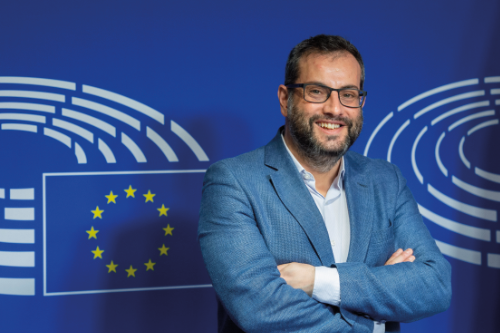Inclusion through sport projects must be more visible and better supported
Iban García del Blanco is an MEP and co-chair of the European Parliament “Sports” group. This informal body lobbies to strengthen the place of sport in the policies of the European Union (EU). Although support mechanisms exist, such as the Erasmus+ Sports programme, challenges remain to sustain projects and make them more visible.
 The social inclusion of newcomers to Europe has been at the heart of the debate since the intensification of migration flows in 2015, a situation that has been itensified again by the war in Ukraine. What role can the sport actors play in this issue?
The social inclusion of newcomers to Europe has been at the heart of the debate since the intensification of migration flows in 2015, a situation that has been itensified again by the war in Ukraine. What role can the sport actors play in this issue?
Sport is a powerful social integration tool that has to be used and promoted, alongside other mechanisms, to achieve the goal of full integration and inclusion of refugees into their local communities. In the transition process towards full integration of migrant populations in general, and refugees in particular, sport can contribute to alleviate trauma and support the psychological and social well-being of individuals in marginalised, traumatised or other at-risk groups. Moreover, by getting to know each other, sports can help overcome differences between communities.
In this scenario, trainers and coaches are key to create an inclusive environment for people of migrant backgrounds in general. Therefore, allocating resources for the development of training programmes that focus on sensitization and cultural awareness for trainers and coaches in the sports industry is an absolute must.
What are the positions and commitments of the “Sports“group on the topic?
Since the acquisition of competences in this field after the Lisbon Treaty, the role of the European Parliament is fundamental to establish policies that promote the use of sport to achieve inclusion of certain groups. It is the responsibility of policymakers to put sport on the political agenda of the European Parliament to get the most out of its many benefits.
For the European Parliament and for the “Sports“ group, the use of sport for the inclusion of refugees is fundamental. We have fought to have European funds in programmes such as Erasmus+ programme, to develop the FIRE+ project led by Sport and Citizenship, the SPIN Refugees Project within the European Sport Inclusion Network, or the Social Inclusion and Volunteering in Sports Clubs in Europe (SIVSCE), among others.
“ Allocating resources for the development of inclusive programmes is a must ”
Many grassroots actors have reported the lack of recognition of their actions. How can we ensure that sport, and specifically football, is more widely recognised?
Above all, the work that grassroots actors carry out must gain visibility so that they can serve as an example for others, accompanied by incentives that can make possible to use sport, especially football, as an inclusive and democratising tool. For example, there are European projects that can provide them with resources to make it possible for refugees in their area to play football in their club in an inclusive way. However, it seems clear to me that from the side of the European institutions we should make an extra effort to get the information on projects and funding known to the interested parties so they become beneficiaries of those projects and funds.
 You took the floor during parliamentary debates on the role of sport in combating discriminations, particularly racism. What are your positions on these matters?
You took the floor during parliamentary debates on the role of sport in combating discriminations, particularly racism. What are your positions on these matters?
Racism is a social scourge that has no room in the European Union and must be eradicated. Sport is a democratising tool that makes everyone who plays it equal. It does not matter your purchasing power, your social position or where you come from. Sport has rules for everyone to compete on an equal footing; its democratic nature educates individuals in the European values of equality and democracy. It is therefore my personal goal to highlight the unparalleled potential of sport to combat and prevent racism.
Sport and Citizenship 56 : Conclusion of the Fire+ project







 INSCRIPTION
INSCRIPTION
 CONTACT
CONTACT FACEBOOK
FACEBOOK